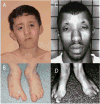Exome sequencing identifies the cause of a mendelian disorder
- PMID: 19915526
- PMCID: PMC2847889
- DOI: 10.1038/ng.499
Exome sequencing identifies the cause of a mendelian disorder
Abstract
We demonstrate the first successful application of exome sequencing to discover the gene for a rare mendelian disorder of unknown cause, Miller syndrome (MIM%263750). For four affected individuals in three independent kindreds, we captured and sequenced coding regions to a mean coverage of 40x and sufficient depth to call variants at approximately 97% of each targeted exome. Filtering against public SNP databases and eight HapMap exomes for genes with two previously unknown variants in each of the four individuals identified a single candidate gene, DHODH, which encodes a key enzyme in the pyrimidine de novo biosynthesis pathway. Sanger sequencing confirmed the presence of DHODH mutations in three additional families with Miller syndrome. Exome sequencing of a small number of unrelated affected individuals is a powerful, efficient strategy for identifying the genes underlying rare mendelian disorders and will likely transform the genetic analysis of monogenic traits.
Figures


Comment in
-
Exome sequencing makes medical genomics a reality.Nat Genet. 2010 Jan;42(1):13-4. doi: 10.1038/ng0110-13. Nat Genet. 2010. PMID: 20037612
-
Exome sequencing: locating causative genes in rare disorders.Clin Genet. 2010 Jul;78(1):32-3. doi: 10.1111/j.1399-0004.2010.01414_1.x. Clin Genet. 2010. PMID: 20597920 No abstract available.
-
Exome sequencing: expanding the genetic testing toolbox.Clin Genet. 2010 Aug;78(2):132-4. doi: 10.1111/j.1399-0004.2010.01452_1.x. Clin Genet. 2010. PMID: 20662854 No abstract available.
References
Publication types
MeSH terms
Substances
Grants and funding
LinkOut - more resources
Full Text Sources
Other Literature Sources
Medical
Molecular Biology Databases
Miscellaneous

